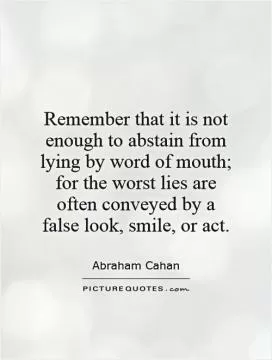Only the other world has substance and reality; only good deeds and holy learning have tangible worth

Only the other world has substance and reality; only good deeds and holy learning have tangible worth
Abraham Cahan, a prominent figure in the world of Jewish-American literature, was a firm believer in the power of good deeds and holy learning. Throughout his life and career, Cahan emphasized the importance of living a virtuous and meaningful existence, rooted in the values of compassion, justice, and righteousness. In his writings, Cahan often explored the themes of morality, ethics, and the pursuit of spiritual enlightenment, highlighting the transformative power of selfless acts and the pursuit of knowledge.Cahan's belief that "only the other world has substance and reality" speaks to his conviction that true fulfillment and meaning can only be found in the pursuit of spiritual growth and enlightenment. For Cahan, the material world was transient and ephemeral, while the spiritual realm held eternal significance and value. He believed that by engaging in good deeds and holy learning, individuals could transcend the limitations of the physical world and connect with a higher, more profound reality.
In Cahan's view, good deeds and holy learning were not just abstract concepts, but tangible expressions of one's commitment to living a life of purpose and meaning. Through acts of kindness, compassion, and generosity, individuals could make a positive impact on the world around them and cultivate a sense of inner peace and fulfillment. Similarly, by engaging in the pursuit of knowledge, wisdom, and spiritual growth, individuals could deepen their understanding of themselves and the world, and ultimately, achieve a greater sense of connection to the divine.
Cahan's emphasis on the importance of good deeds and holy learning is reflected in his own life and work. As a writer, editor, and social activist, Cahan dedicated himself to promoting social justice, equality, and the well-being of others. Through his writings, he sought to inspire readers to reflect on their own values and beliefs, and to consider how they could contribute to a more just and compassionate society.












 Friendship Quotes
Friendship Quotes Love Quotes
Love Quotes Life Quotes
Life Quotes Funny Quotes
Funny Quotes Motivational Quotes
Motivational Quotes Inspirational Quotes
Inspirational Quotes